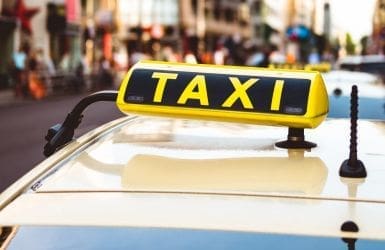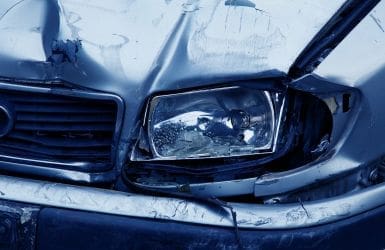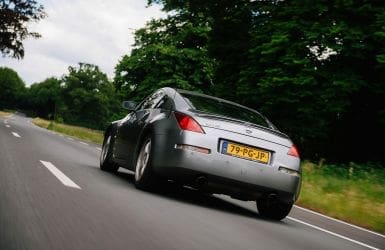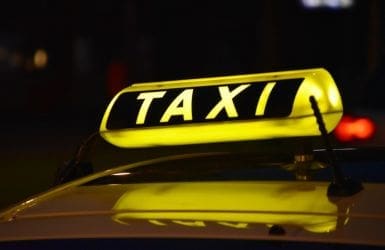
Huge drop in number of new cabs first 7 months 2020
The first 7 months of 2020 saw a huge drop in the number of cabs allowed on Dutch roads for the first time, compared to the same months last year.
Figures from the RDW show that July showed the biggest difference. While last July there were 637 cabs allowed on the road for the first time, this year there are only 38. A huge drop of more than 94%.
Less work for cabs due to corona crisis
Because of the corona crisis, there is often little to drive for cab drivers. As a result, cab companies choose to temporarily suspend the license plates of cabs and temporarily stop cab insurance. Cab companies that do not use public roads for an extended period of time may choose to suspend the license plate. The vehicle must then be removed from public roads. The advantage of this is that no road tax has to be paid, there is no obligation for a MOT inspection, and the obligation for third-party insurance also lapses.
According to RDW figures, currently 15% of vehicles classified as cabs are designated, are not insured. If all is well, these vehicles are off the public roads and does not necessarily mean that these cabs are driving around uninsured.
The decline in the number of cabs does not seem to be entirely due to the corona crisis. January this year, when corona was not yet in the Netherlands, already showed a decline compared to the same month last year.
Cabs difficult to insure
As of Jan. 1, 2018, many insurers chose to stop insuring cabs. As a result, many cabs were driving around uninsured. Cabs are difficult to insure. This has been a thorny issue for years. Insurers find covering the risks of cab companies too risky. Because of this, entrepreneurs with a cab or courier service who want to take out cab insurance with WA coverage or all-risk coverage have to rely on De Vereende. De Vereende Verzekeringen is the company that is willing to insure special risks where regular companies drop out. The premiums of these insurances are a lot higher.
The Association of Insurers states that it is difficult for cabs to get insurance. There have even been Parliamentary questions and in late 2018 the Minister of Finance indicated that he did notmen. It further states that 99% of common risks can be properly insured. That goes perhaps individuals, although the the claim burden in moped insurance is also enormous.
Alpina is one of the few intermediaries where it is possible to take out cab insurance through De Vereende. Nevertheless, even in the number of cab insurance visits a huge drop can be seen. We see a 32% decrease in the number of visits for cab insurance in the first 7 months of 2020 compared to 2019.
From 2020, no refund of BPM for cabs
It won't be made easy for cabs. Cab companies will not receive BPM from 2020 more back when buying a new cab.
Previously, cab companies could reclaim the BPM paid on a passenger car used at least 90% as a cab from the tax authorities.
The BPM refund on cabs has been abolished because the Dutch government's goal in the Climate Agreement is to cut greenhouse gas emissions in half by 2030 compared to 1990. As a result, all kinds of measures are being taken to reduce those CO2 emissions. This measure should ensure that cab companies become motivated to purchase less polluting cabs.
This measure negatively affects many cab companies. The choice in the supply of cars that do not emit CO2 is very limited. In addition, cars that emit less or no CO2 are mostly electric cars. These cars weigh a lot more than a comparable car running on diesel because of the battery pack. This in turn makes for a higher premium because it is calculated in part based on the weight of the car.
Cab companies that currently have their cab insured on a hull, excluding BPM, will not be able to buy back a comparable cab in the event of a total loss, as of January 1, 2020, for the insured amount. This is because the insured amount excluding BPM has become too low.
Stricter control of cab insurance
In addition to the measure to abolish the refund of BPM on cabs, all cabs, starting October 1, 2019, will be 100% checked for having valid cab insurance and MOT.
Every cab is checked at least once a year by the RDW. This is done through an automated check. Cabs driving uninsured on the road are fined and must pay for any damage caused. The fine for driving an uninsured vehicle is between 400 and 600 euros.
Relaxation of corona measures positive for cab companies
The relaxation of corona measures may have a positive effect on the cab industry. With more and more pubs, restaurant and cultural institutions being allowed to reopen on a limited basis since June 1, demand for cab rides is expected to increase.
May this year, with only 3 cabs, is a huge low in the number of first-time cab admissions. June and July saw another small increase. Whether this increase and the relaxation of corona measures will continue remains to be seen.
We can be reached via Chat, Whatsapp, phone or email
Please feel free to contact us if you would like to know more.
We are here Monday to Friday from 08:00 to 18:00.









